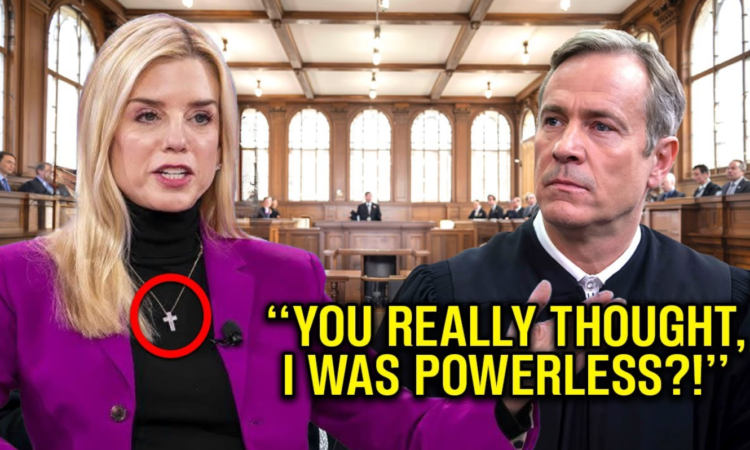Judge Tried to Silence Pam Bondi with a $50,000 Fine—But She Turned the Tables in Seconds

When a Florida judge hit Pam Bondi with a $50,000 fine to silence her, no one expected what she’d do next. But within seconds of entering that courtroom, she flipped everything. Everyone was stunned.
This wasn’t the kind of case Pam Bondi ever thought she’d be pulled into—especially not after stepping away from the legal spotlight years ago. Yet there she stood, in courtroom 4B at the Hillsborough County Courthouse in Tampa, Florida, facing a contempt fine with her name on it.
The courtroom was quiet, but it was a heavy kind of silence. Tense. Even the bailiff avoided eye contact. When her name was called, Pam stood up calmly, adjusted her navy blazer, and waited. The judge didn’t waste time.
“This court finds you in contempt for knowingly violating a direct gag order,” Judge Corbin said. “You are hereby fined $50,000 to be paid in full within 30 days.”
Pam didn’t flinch. She said, “Understood.” But then she reached into her briefcase and pulled out a worn manila folder. No one breathed. Everyone had heard the rumors—that Pam had accused a sitting judge of silencing whistleblowers and burying documents in a corporate liability case.
The judge raised an eyebrow. “Miss Bondi, do you have something to submit to the court?”
“I do,” she replied. “But only if you’re prepared to hear the full context.”
The judge nodded. She opened the folder. Inside were documents—an email, a deposition, and an affidavit. Each one pointing to serious misconduct: hidden files, erased evidence, instructions to remove testimony from record. One affidavit claimed Judge Corbin himself ordered files to be withheld in a hospital negligence case.
“I never broke the gag order,” Pam said. “I never discussed the case directly. But I did speak about what I saw—because the public deserves to know when justice is manipulated.”
The room was frozen. And that was just the beginning.
Six months earlier, Pam was enjoying a quiet life in Clearwater Beach when she got a call from an old friend, Leah. Leah had found something—something serious. A voicemail between two people arguing over a missing court document. The woman’s voice was scared. “He pulled it,” she said. “Then you didn’t hear it from me,” the man replied.
Pam couldn’t ignore it. She drove to meet Leah, who handed her the original complaint from a case that had been quietly settled—a nurse named Jonas McNeil had sued a hospital for negligence. But key parts of the complaint, including accusations against two hospital administrators, had been removed. And the judge on the case? Roger Corbin.
Pam dug deeper. She met with Denise, a former court assistant, who revealed that she had been told to remove a deposition from the record. It had said a 15-year-old patient named Elijah could have been saved—but the hospital ignored warnings, and the boy died.
As Pam started speaking publicly, quiet warnings turned into real consequences. Invitations dried up. A scheduled speaking event was canceled. Even her accountant called and told her to be careful. But she kept going.
She collected more documents. More stories. A former legal intern who was fired for flagging duplicate files. A court stenographer whose clean transcript was mysteriously sent back for “editing.” A paralegal who said Corbin met with hospital lawyers during trial recesses.
When the court rushed her contempt hearing, she showed up alone—no lawyer, just a folder of truth.
“This is not a platform for personal crusades,” the judge said.
“I know the rules,” Pam replied. “And I know when they’re being twisted.”
She filed a formal motion requesting a judicial review of the McNeil case. And she wasn’t bluffing—she was ready to take it to federal court. The judge said he’d issue a written response within seven business days.
She didn’t wait. Pam went to the press. Told her story. A quote from her interview made the front page: “The only thing they can do now is prove me right—or prove me wrong.”
That quote sparked something. People started reaching out. Former staffers, interns, even a retired bailiff. One person anonymously sent her a redacted court memo—initials R.C. Roger Corbin.
But when the court’s written response finally came, it was brief. Motion denied. Fine upheld. One signature: Roger C. Corbin.
Pam didn’t back down. She held a press conference outside the courthouse. “This is not about revenge. It’s about whether our courts answer to truth—or to themselves.”
She announced her federal appeal. That same week, the Florida Judicial Qualifications Commission announced an internal review of Judge Corbin’s case history.
It wasn’t a full victory. But it was a crack in the wall.
Pam kept going. Calls kept coming. People were tired of being silent. One day, an anonymous note arrived in the mail: “I was one of the jurors in the McNeil case. We never saw the real file. Thank you for not letting it slide.”
No spotlight. No celebrations. But Pam had done what mattered. She didn’t run from the truth. And because of that, the truth finally got a chance to be heard.
She once told a law student, “Your reputation won’t be built on how many cases you win—it’ll be built on how many truths you don’t run from.” Now she knew just how real those words were.
And if you’re ever told to sit down, stay quiet, and let it go—remember Pam Bondi. Because one voice, backed by truth, still matters. Even when it costs you. Especially when it costs you.




